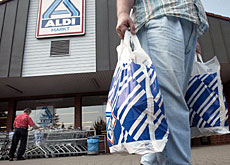Supermarket bosses warn of coming job squeeze

The heads of Switzerland’s two largest supermarkets have warned that growing price competition could cost thousands of jobs in years to come.
However, they say they are not unduly worried about the threat from German hard discounters Aldi and Lidl, who plan to enter the Swiss market in the near future.
Their “Swiss phlegm” approach to looming competition has won support from a surprising quarter – former Aldi top boss Dieter Brandes.
The future of the retail sector was the focus of a top-level public debate at the Swiss Economic Forum in Thun, which brought together Migros boss Anton Scherrer, Coop counterpart Hansueli Loosli, Philippe Gaydoul, head of top Swiss discounter Denner, and Brandes, the former boss of Aldi Nord.
“We can see the loss of up to 10,000 jobs over the next five years or so in the sector, out of a total of 200,000 to 300,000,” Scherrer told the forum.
“Last year saw the loss of about 2,000 jobs and that trend is likely not only to continue but to accelerate with the expected arrival of Aldi and Lidl in Switzerland.”
Price to pay
Scherrer said there would be a clear need to increase operational efficiency, as the discounters were capable of generating similar revenue with much lower staff costs.
He added that Swiss agricultural policy, which put strong upward pressure on costs, represented a bigger threat to future jobs and profits than cut-price foreign competition.
Loosli said there would be fewer jobs in the sector in future, regardless of whether Aldi and Lidl come to Switzerland.
“There is a clear customer trend today to demand lower prices. That is a wish that can be complied with, but there will be a price to pay,” he said.
Gaydoul pointed out that job cutting was “not an issue” at Denner, as it managed to create new jobs year-on-year.
All three stressed that further cuts in the – often minimal – wage levels for existing jobs were not on the agenda, at least in the immediate future.
Sporting challenge
Former Aldi boss Brandes surprised some participants by playing down fears that Aldi and Lidl would revolutionise the Swiss market the way they had done in Germany.
“I am quite surprised that Aldi has decided to come to Switzerland, which already has strong established players and a complicated set of legal challenges,” he said.
“There are certainly countries in Europe that would be a lot easier to enter. Maybe they see it as some sort of sporting challenge!”
One thing participants agreed on was the need to liberalise the Swiss legal framework, aspects of which currently penalise both companies and customers.
Loosli stressed the need to relax rules in areas such as opening hours and night driving for delivery lorries.
He said employees in other sectors worked overnight and at weekends when necessary, but added that no company would demand extra working hours unless it could generate extra revenue to match.
Necessary obstacles
Gaydoul called for a lifting of restrictive import barriers – in particular, the extension to Switzerland of the “Cassis de Dijon” principle, under which (most) articles approved for sale in any one European Union country can automatically be sold in others.
The Swiss government said earlier this month that it wanted to adopt the principle.
Scherrer said Migros considered it a priority in order to ensure that the price gap between its own products and those offered by discount stores was “not too large”.
He added that Swiss retailers would “doubtless manage to introduce the necessary obstacles to make things as difficult as possible for Aldi and Lidl”.
Brandes said there would continue to be “big differences” between the discounters and the rest, both in terms of price and product range.
“The new discount store business model affects the overall market in much the same way as a major technological advance,” he said.
As in other sectors, new models had the same effect as technological breakthroughs. They could eliminate the need for many traditional jobs, but might also create new employment opportunities, said Brandes.
And competitors would be well advised not to try copying the new model without understanding what really made it work.
Brandes said the key to Aldi’s success was not the highly visible “surface” elements, but the underlying – and largely invisible – differences in the way the entire business was organised and managed.
swissinfo, Chris Lewis in Thun
German hard discounters Aldi and Lidl, which have taken the German market by storm, are planning to set up shop in Switzerland.
However, Migros and Coop, with a joint food market share of over 70%, may prove tougher to beat.
Swiss retail bosses say they are more worried about agricultural subsidies and import rules than foreign competition.

In compliance with the JTI standards
More: SWI swissinfo.ch certified by the Journalism Trust Initiative


You can find an overview of ongoing debates with our journalists here . Please join us!
If you want to start a conversation about a topic raised in this article or want to report factual errors, email us at english@swissinfo.ch.